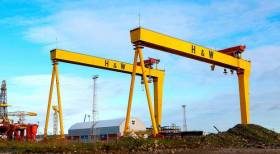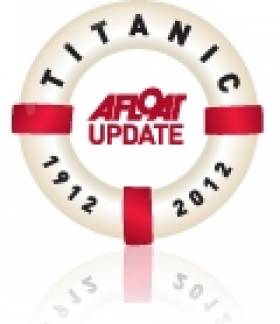Displaying items by tag: Queens Island Belfast
For Sale As Harland & Wolff's Norwegian Owner Fred Olsen Instigates Restructuring Process
#BelfastLough - A famous icon of Belfast, Harland & Wolff is up for sale as its Norwegian parent company Fred Olsen carries out a major restructuring.
The former shipbuilder behind the Titanic reports The Belfast Telegraph, has diversified into renewable energy installations since the last ship sailed out of its famous yard in 2003.
The decline of shipbuilding has also been marked by a steady fall in employee numbers from as many as 30,000 in the 1930s to around 100 today.
Harland & Wolff: Shipbuilder an enduring chapter of Belfast story for more than 150 years
A sale would mark one of the biggest corporate transactions in Northern Ireland in recent years after three decades in the ownership of Fred Olsen.
Harland &Wolff covers two sites on Queen's Island in east Belfast, including the Belfast Repair Dock where some ship work is still carried out.
There is also the main building dock and manufacturing halls where the famous Samson and Goliath gantry cranes operate.
The combined surface area of the sites is nearly 90 acres.
The building dock is the biggest in Europe, and one possible use is for the construction of next generation very large vessels in excess of 500,000 tonnes.
Yesterday a spokesman said: "Harland & Wolff Heavy Industries Ltd can confirm that as part of wider restructuring activities, it is engaged in a marketing process that may lead to a potential sale of the business.
"The day to day running of the company is unaffected."
For much more on this development,click here.
Cruiseship Call to Remember Belfast's Titanic
#TITANIC- In this centenary year of the R.M.S.Titantic's sinking, Fred Olsen Cruise Lines Balmoral is to include a port of call to Belfast Harbour, where passengers are to visit the Harland & Wolff shipyard, during an Easter mini cruise in early April, writes Jehan Ashmore.
Balmoral will be the first cruiseship to berth in Belfast this year and her passengers are to visit the world famous shipyard on Queens Island where the liner was built for the White Star Line.
In addition there will be opportunities to call to the Botanical Gardens, Ulster Museum and Belfast Castle. The three-night mini-cruise starts in Southampton and is to include an en-route call to Liverpool, a former City of Culture.
For further information on other cruise calls to Belfast as previously reported on Afloat.ie click this HERE. In addition to the Titanic Walking Festival (31 March-22 April) as also reported click HERE

























































